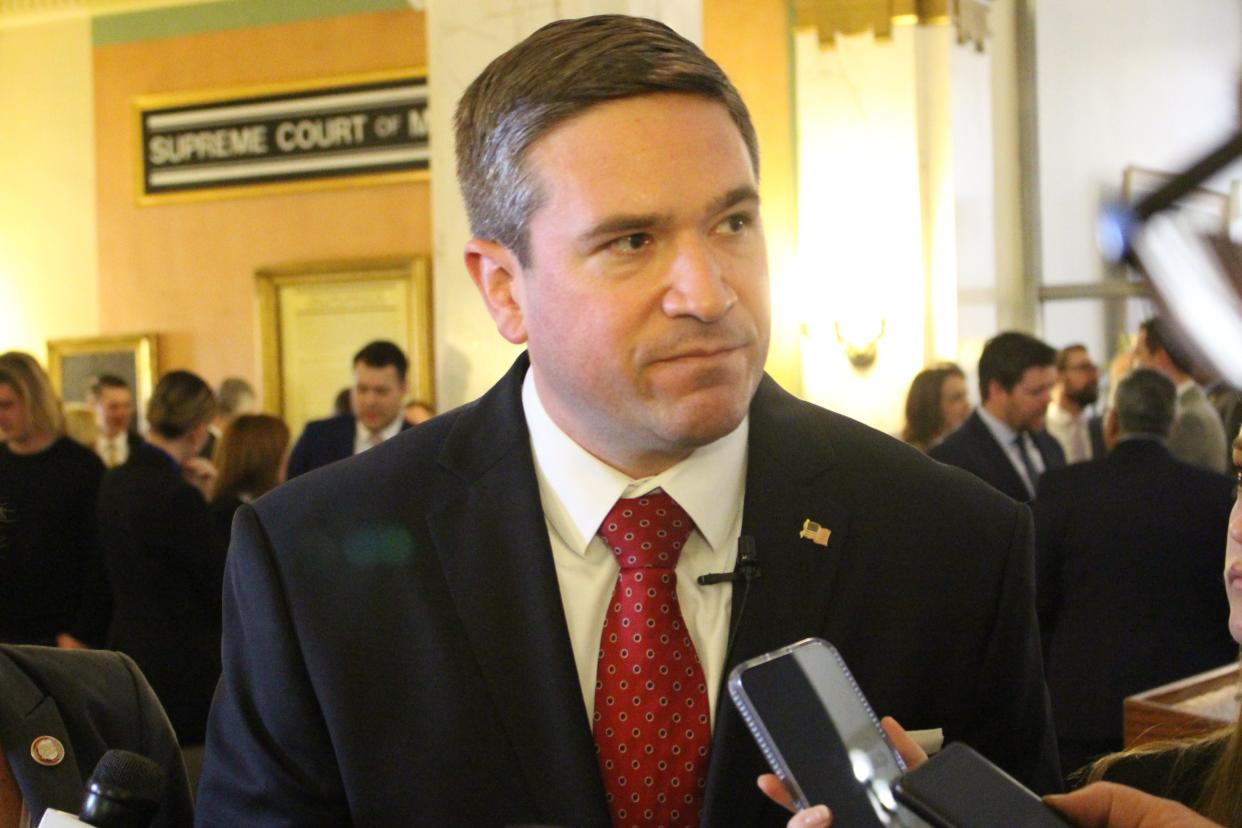A St. Louis judge is slated to rule Monday on Missouri AG's transgender rule. What to know

St. Louis County Court Judge Ellen Ribaudo is expected to make a decision Monday on a temporary restraining order that could block the enforcement of Attorney General Andrew Bailey's rule to restrict "experimental interventions to treat gender dysphoria" for both adults and minors.
The attorney general's order had been set to take effect Thursday, April 27. But after a federal judge blocked an attempt by Bailey's office to move the case out of state court, Ribaudo delayed implementation to allow time for a ruling on temporary restraining order requested by the groups challenging the rule.
“While we welcome this temporary relief, we look forward to the judge ultimately preventing this rule from going into effect,” legal advocates Lambda Legal and ACLU of Missouri said in a joint statement on Wednesday.
In the meantime, here's how we got there.
How did the lawsuit start?
Bailey first announced the emergency rule was coming in late March. At that point in time, it was believed the rule would apply only to minors. On April 13, Bailey's office released the official language of the rule, which put restrictions in place for "experimental interventions to treat gender dysphoria" for both adults and minors. It also outlined the date that the emergency rule would begin — April 27.
On April 24, legal advocacy groups filed a motion requesting a temporary restraining order that would block the emergency rule from being enforced. The lawsuit, Southampton Community Healthcare v. Bailey, was filed in the St. Louis County Circuit Court on behalf of Southampton Community Healthcare in St. Louis, Kelly Storck, Logan Casey, and the families of two transgender people. A hearing was set for April 26 at 1:30 p.m.
On the evening of April 25, the Attorney General's Office filed a notice of removal, which attempted to move the case from state court to federal court.
More: In wake of AG's emergency rule, trans Ozarkers fear for safety, access to care
Why did the AG's office try to go to federal court?
In the notice of removal filed by Missouri's Solicitor General Joshua Divine, the notice cites 28 U.S.C. § 1331, which gives district courts jurisdiction over "civil actions arising under the Constitution, laws, or treaties of the United States." In Southampton Community Healthcare's request for a temporary restraining order, they allege that the emergency rule violates the U.S. Constitution as well as the Missouri Constitution, therefore, Bailey argues, the case falls under federal jurisdiction.
What happened in federal court?
Legal advocacy groups filed an emergency motion to remand the case back to state court. Judge Henry Autrey heard the motion, and ruled that the case be sent back to state court due to a lack of federal jurisdiction.
Now that the case is back in state court, what is happening?
After the case was sent back to state court, Divine filed a motion for a change of judge. The case was transferred from St. Louis County Circuit Court Judge Kristine Kerr to Judge Ellen Ribaudo.
During a hearing on Wednesday afternoon, Ribaudo issued a stay of enforcement that would allow the court time to "review the briefing sufficiently." According to court records, Ribaudo anticipates having a ruling on the temporary restraining order by 5 p.m. on May 1.
"This order merely stays the implementation of our rule so the Court can review the briefing. We will continue fighting for all patients to have access to adequate health care," said Madeline Sieren, spokesperson for the Attorney General's office.
More: St. Louis Co. Judge: Attorney general's emergency rule won't go into effect until May 1
What is happening in the legislature as far as proposals to limit transgender kids' health care and participation in sports?
Both the Missouri House and Senate have approved proposals that would limit gender-affirming medical treatments for minors and restrict transgender students from participating on girls sports teams. Those bills are currently awaiting a vote as to whether the House or Senate versions become law. House and Senate leaders assured reporters at Capitol that the bills will be passed, but are debating which versions of the bills will advance.
However, on Thursday, Gov. Mike Person said he's ready to force lawmakers to keep working if they do not send him bills putting limits on transgender kids' health care and participation in sports by the session's upcoming end.
A spokeswoman for Parson confirmed that he plans to call a special legislative session if lawmakers fail to pass bills on transgender issues by the May 12 end of their regular session.
This article contains reporting from the Associated Press. Susan Szuch is the health and public policy reporter for the Springfield News-Leader. Follow her on Twitter @szuchsm. Story idea? Email her at sszuch@gannett.com.
This article originally appeared on Springfield News-Leader: What to know about lawsuit over Missouri AG's transgender health rule

